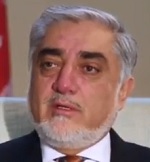Afghan Co-Puppet Pushes U.S. War Propaganda
Michael Hughes
October 1, 2018
Afghan CEO and co-leader Abdullah Abdullah put forth the dubious proposition that the Trump administration’s South Asia strategy is working because without it the situation would be much worse. In the first place, Abdullah cites an unprovable counterfactual that can be employed to support any claim regardless of empirical results. Moreover, there is plenty of evidence – including conclusions by U.S. government agencies – that outright refute Mr. Abdullah’s assertion.
President Ashraf Ghani has publicly spun similar absurdities all in line with Pentagon talking points about the U.S. strategy President Trump unveiled last August. On the sidelines of this year’s UN General Assembly (UNGA) in New York Abdullah took the opportunity to reinforce this nonsense to the Western press. He also sent a foreboding message about the perils of withdrawal.
“Imagine a situation without that [U.S.] commitment. Things would be very different,” Abdullah said in an interview with Fox News that was published on September 30. “It [Trump’s strategy] is working.”
The Afghan CEO, suspiciously echoing U.S. military commanders and White House security aides, also suggested that Trump’s “conditions-based” approach to the conflict is a major improvement upon the Obama administration’s self-defeating “time-based” strategy. And, without any proof, Abdullah predicted that Trump’s war plan will eventually harvest dividends.
“These sorts of policies will yield results… you will see fruition. It won’t be in a matter of days or months, but as long as it’s [on] the right track it will bring results,” Abdullah told FOX.
Although he admitted it is too difficult to estimate, Abdullah also boldly predicted that the U.S. occupation “won’t be a 50-year engagement.” Yet, how in the world does he know? In 2001, it is doubtful anyone foresaw that the Afghan war would last 17 years and become the longest conflict the United States has ever been involved in.
As part of Trump’s strategy the U.S. loosened rules of engagement, boosted troop levels and intensified the air campaign – dropping more bombs on Afghanistan in 2018 than at any time since 2001. Yet the results so far have been nil. In fact, some have estimated that the Taliban gained complete control over more territory while increasing its influence in more than 66 percent of the country since Trump launched the strategy.
In its most recent quarterly audit, the Special Inspector General for Afghanistan Reconstruction (SIGAR) threw a wet towel on the Pentagon’s rosy assessments. SIGAR bluntly concluded that the U.S. stabilization effort since 2002 has “mostly failed.”
The Wall Street Journal on August 31 reported that U.S. intelligence officials have disputed the military’s positive outlook about Trump’s new strategy. According to the report, there is broad consensus among the intelligence community that “the trajectory of the 17-year-old war hasn’t significantly shifted over the year that Mr. Trump’s strategy has been in effect.”
It is also worth pointing out how the Taliban had an epic summer in terms of high-profile attacks and stunning operations including the siege of Ghazni in August. The four-day assault left some 400 dead and was a public relations coup for the insurgents, drawing comparisons to the 1968 Tet offensive, which was the turning point in the war in Vietnam.
Abdullah, however, is absolutely correct in noting that the Taliban are operating out of sanctuaries in Pakistan. Of course, this is nothing more than stating the obvious, and government and military officials in neither Kabul nor Washington have proffered a viable solution for dealing with these insurgent breeding grounds.
If anything, with the rise of Imran “Taliban” Khan as prime minister one can easily speculate that Pakistan will be providing even more support to anti-Afghan government militants.
Hence, Abdullah’s optimism on the length of the conflict is severely misplaced because unless these safe havens are uprooted – and they likely never will be – the U.S. engagement in Afghanistan will last at least another 50 years.
Despite this elephant in the room, Abdullah and Ghani are right in pressing for peace. It is the least they can do. In a statement to the UNGA on August 26, Abdullah said Afghanistan has “turned a page” by making unprecedented overtures to the Taliban to be part of a credible process to achieve a just and comprehensive political settlement. In the same speech Abdullah, prudently, also resisted claiming progress on the military front while outlining worthwhile aims.
“Our people, who pose no danger to anyone, are demanding a fundamental change where they can play a constructive and collaborative role across boundaries, and help turn their country into a roundabout of people, goods, services, communications, cooperation and ideas across the wider region,” Abdullah said. “I believe that with your help we can turn this concept into reality.”
To be fair, Abdullah and Ghani should be commended for proactively trying to implement a ceasefire and aspiring for an inclusive political solution. However, when it comes to the military situation on the ground, Mr. Abdullah should choose his words more judiciously instead of insulting the collective intelligence of the Afghan people, the American public and the rest of the international community.

